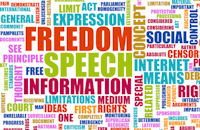Bloggers Have Same First Amendment Rights as the Press
 In a major free-speech ruling, the Ninth Circuit decreed that bloggers have the same First Amendment rights as the institutional, commercial press. The ruling demolishes the argument that in the eyes of the law, bloggers are not journalists.
In a major free-speech ruling, the Ninth Circuit decreed that bloggers have the same First Amendment rights as the institutional, commercial press. The ruling demolishes the argument that in the eyes of the law, bloggers are not journalists.
The case involved a scurrilous blogger, Crystal Cox of Oregon writing on her blog http://obsidianfinancesucks.blogspot.com. She was held liable in 2011 for defamation for her attacks on a bankruptcy trustee -- see Lying Blogger Must Pay $2.5 Mil for Defamation.
-
The posts accuse trustee Kevin Padrick of engaging in “illegal activity, “including “corruption,” “fraud,” “deceit on the government,” “money laundering,” “defamation,” “harassment,” “tax crimes,” and “fraud against the government.” Cox also claimed that Obsidian paid off “media” and “politicians” and may have hired a hit man to kill her.
But the Ninth Circuit said, "Cox’s consistent use of extreme language negates the impression that the blog posts assert objective facts." Because the posts were so hyperbolic, the court said they were unbelievable as facts -- and that she was not liable for writing them. -
However she was held liable for writing that the trustee committed tax fraud while administering the assets of a company in a Chapter 11 bankruptcy, and calling for the IRS and the Oregon Department of Revenue to investigate the matter.
The Ninth Circuit said this charge is a matter of public concern, and that the trustee had to prove negligence to win a defamation suit against her. This is the standard applied to institutional corporate TV, newspaper and radio news operations. "This court has held that even consumer complaints of non-criminal conduct by a business can constitute matters of public concern," the court said.
The Ninth circuit added that the blogger could not be held liable for "presumed damages" without a showing of "actual malice" -- that she knew the post was false or acted with reckless disregard of its truth or falsity.
"The protections of the First Amendment do not turn on whether the defendant was a trained journalist, formally affiliated with traditional news entities, engaged in conflict-of-interest disclosure, went beyond just assembling others’ writings, or tried to get both sides of a story. As the Supreme Court has accurately warned, a First Amendment distinction between the institutional press and other speakers is unworkable: “With the advent of the Internet and the decline of print and broadcast media . . . the line between the media and others who wish to comment on political and social issues becomes far more blurred.” Citizens United , 558 U .S. at 352. In defamation cases, the public-figure status of a plaintiff and the public importance of the statement at issue—not the identity of the speaker—provide the First Amendment touchstones," the Ninth Circuit said.
The case is Obsidian Finance Group and Kevin Padrick v. Crystal Cox, case No. 12-35238.




Larry- sharing this right now with my friends who blog at the professional level. Here's an additional thought: Isn't it true that in today's digital world, we're all media companies? Don't each of us have the same opportunity or power to communicate a thought or message as large well established institutions? The lines are indeed becoming more and more blurred.